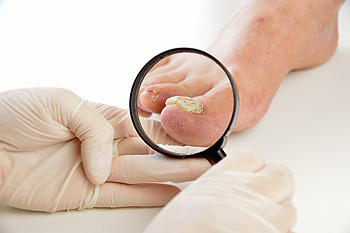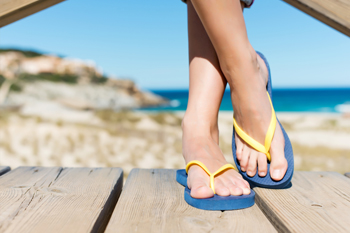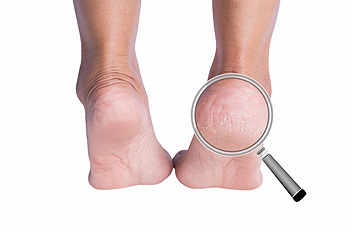Blog Archives
Items filtered by date: August 2020
What Are the Risk Factors for Fungal Nail Development?
 A fungal nail infection, also known as onychomycosis, is a common condition that affects up to 10% of all Americans. There are several risk factors for developing this condition. Wearing tight footwear can crowd the toes and cause them to become moist and warm. This creates the perfect conditions for fungus to thrive in, so try to avoid this by wearing wider, open-toed shoes. Exercise might cause repetitive minor trauma to the nail, allowing fungus to invade. Communal showers and other public areas like locker rooms and pools increase your risk of exposure to fungus, so make sure to not walk barefoot in these places. Finally, various diseases, such as diabetes and AIDS that can weaken the immune system, make it easier for fungal nail infections to occur. If you have a fungal nail infection, it is recommended that you seek medical treatment from a podiatrist.
A fungal nail infection, also known as onychomycosis, is a common condition that affects up to 10% of all Americans. There are several risk factors for developing this condition. Wearing tight footwear can crowd the toes and cause them to become moist and warm. This creates the perfect conditions for fungus to thrive in, so try to avoid this by wearing wider, open-toed shoes. Exercise might cause repetitive minor trauma to the nail, allowing fungus to invade. Communal showers and other public areas like locker rooms and pools increase your risk of exposure to fungus, so make sure to not walk barefoot in these places. Finally, various diseases, such as diabetes and AIDS that can weaken the immune system, make it easier for fungal nail infections to occur. If you have a fungal nail infection, it is recommended that you seek medical treatment from a podiatrist.
For more information about treatment, contact Dr. Sharon Pletcher of Pennsylvania. Our doctor can provide the care you need to keep you pain-free and on your feet.
Toenail Fungus Treatment
Toenail fungus is a condition that affects many people and can be especially hard to get rid of. Fortunately, there are several methods to go about treating and avoiding it.
Antifungals & Deterrence
Oral antifungal medicine has been shown to be effective in many cases. It is important to consult with a podiatrist to determine the proper regiment for you, or potentially explore other options.
Applying foot powder on the feet and shoes helps keep the feet free of moisture and sweat.
Sandals or open toed shoes – Wearing these will allow air movement and help keep feet dry. They also expose your feet to light, which fungus cannot tolerate. Socks with moisture wicking material also help as well.
If you have any questions please feel free to contact our office located in State College, PA. We offer the newest diagnostic tools and technology to treat your foot and ankle needs.
Read more about How to Treat Your Toenail FungusDo Your Child's Feet Hurt?
What Is Causing My Heel Pain?
 Heel pain is usually an overuse injury. One common source of heel pain is plantar fasciitis which occurs when the plantar fascia, the tissue connecting the heel to the bottom of the foot, becomes inflamed. Another source of heel pain is Achilles tendonitis, and this is the inflammation of the Achilles tendon. Heel spurs, which are a bony growth at the bottom of the heel, are also common sources of heel pain. Other factors that can lead to heel pain include stress fractures, tarsal tunnel syndrome, wear and tear of the heel pad, and heel bursitis. If you are suffering from any type of heel pain, it is important to consult with a podiatrist for a proper diagnosis and treatment plan.
Heel pain is usually an overuse injury. One common source of heel pain is plantar fasciitis which occurs when the plantar fascia, the tissue connecting the heel to the bottom of the foot, becomes inflamed. Another source of heel pain is Achilles tendonitis, and this is the inflammation of the Achilles tendon. Heel spurs, which are a bony growth at the bottom of the heel, are also common sources of heel pain. Other factors that can lead to heel pain include stress fractures, tarsal tunnel syndrome, wear and tear of the heel pad, and heel bursitis. If you are suffering from any type of heel pain, it is important to consult with a podiatrist for a proper diagnosis and treatment plan.
Many people suffer from bouts of heel pain. For more information, contact Dr. Sharon Pletcher of Pennsylvania. Our doctor can provide the care you need to keep you pain-free and on your feet.
Causes of Heel Pain
Heel pain is often associated with plantar fasciitis. The plantar fascia is a band of tissues that extends along the bottom of the foot. A rip or tear in this ligament can cause inflammation of the tissue.
Achilles tendonitis is another cause of heel pain. Inflammation of the Achilles tendon will cause pain from fractures and muscle tearing. Lack of flexibility is also another symptom.
Heel spurs are another cause of pain. When the tissues of the plantar fascia undergo a great deal of stress, it can lead to ligament separation from the heel bone, causing heel spurs.
Why Might Heel Pain Occur?
- Wearing ill-fitting shoes
- Wearing non-supportive shoes
- Weight change
- Excessive running
Treatments
Heel pain should be treated as soon as possible for immediate results. Keeping your feet in a stress-free environment will help. If you suffer from Achilles tendonitis or plantar fasciitis, applying ice will reduce the swelling. Stretching before an exercise like running will help the muscles. Using all these tips will help make heel pain a condition of the past.
If you have any questions please contact our office located in State College, PA. We offer the newest diagnostic and treatment technologies for all your foot and ankle needs.
Read more about Heel PainAll About Ingrown Toenails
 An ingrown toenail is a condition that occurs when the edges of the toenail grow into the skin. This can be quite painful, resulting in inflammation, redness, tenderness, and swelling of the skin around the ingrown nail. It most commonly affects the nails of the big toes. There are multiple causes for ingrown toenails, including wearing shoes that are too tight, improperly trimming the toenail, and injury to the toe. Some people have an increased risk for developing recurrent ingrown toenails that may be genetic. While ingrown toenails can sometimes be treated at home, in other cases, medical intervention may be required. If you are afflicted with a painful ingrown toenail, it is recommended that you see a podiatrist who can examine the affected nail and prescribe appropriate treatments.
An ingrown toenail is a condition that occurs when the edges of the toenail grow into the skin. This can be quite painful, resulting in inflammation, redness, tenderness, and swelling of the skin around the ingrown nail. It most commonly affects the nails of the big toes. There are multiple causes for ingrown toenails, including wearing shoes that are too tight, improperly trimming the toenail, and injury to the toe. Some people have an increased risk for developing recurrent ingrown toenails that may be genetic. While ingrown toenails can sometimes be treated at home, in other cases, medical intervention may be required. If you are afflicted with a painful ingrown toenail, it is recommended that you see a podiatrist who can examine the affected nail and prescribe appropriate treatments.
Ingrown toenails can become painful if they are not treated properly. For more information about ingrown toenails, contact Dr. Sharon Pletcher of Pennsylvania. Our doctor can provide the care you need to keep you pain-free and on your feet.
Ingrown Toenails
Ingrown toenails occur when a toenail grows sideways into the bed of the nail, causing pain, swelling, and possibly infection.
Causes
- Bacterial infections
- Improper nail cutting such as cutting it too short or not straight across
- Trauma to the toe, such as stubbing, which causes the nail to grow back irregularly
- Ill-fitting shoes that bunch the toes too close together
- Genetic predisposition
Prevention
Because ingrown toenails are not something found outside of shoe-wearing cultures, going barefoot as often as possible will decrease the likeliness of developing ingrown toenails. Wearing proper fitting shoes and using proper cutting techniques will also help decrease your risk of developing ingrown toenails.
Treatment
Ingrown toenails are a very treatable foot condition. In minor cases, soaking the affected area in salt or antibacterial soaps will not only help with the ingrown nail itself, but also help prevent any infections from occurring. In more severe cases, surgery is an option. In either case, speaking to your podiatrist about this condition will help you get a better understanding of specific treatment options that are right for you.
If you have any questions please feel free to contact our office located in State College, PA. We offer the newest diagnostic and treatment technologies for all your foot and ankle needs.
Read more about Ingrown Toenail CareAre Flip-Flops Failing My Feet?
 Flip-flops are a staple of summer footwear, especially at the beach or pool. However, wearing flip-flops may do more harm than good for the health of your foot. If you frequently wear flip-flops, you may notice that you have to constantly flex your toes to keep the shoes firmly on your feet. This toe flexing can lead to bunions and hammertoes, conditions that disfigure the joints of your toes. Flip-flops also provide very little support to your feet while you walk, potentially increasing your likelihood of foot and heel pain, especially if you have flat feet or fallen arches. Since flip-flops increase your feet’s exposure to the elements, you may also be at risk for developing fungal infections, like athlete’s foot and toenail fungus. If you must wear flip-flops, you may be able to avoid damage to your feet by wearing them only for short periods of time. For more information on the effects of flip-flops on your feet, and for treatment of any foot condition, consult with a podiatrist today.
Flip-flops are a staple of summer footwear, especially at the beach or pool. However, wearing flip-flops may do more harm than good for the health of your foot. If you frequently wear flip-flops, you may notice that you have to constantly flex your toes to keep the shoes firmly on your feet. This toe flexing can lead to bunions and hammertoes, conditions that disfigure the joints of your toes. Flip-flops also provide very little support to your feet while you walk, potentially increasing your likelihood of foot and heel pain, especially if you have flat feet or fallen arches. Since flip-flops increase your feet’s exposure to the elements, you may also be at risk for developing fungal infections, like athlete’s foot and toenail fungus. If you must wear flip-flops, you may be able to avoid damage to your feet by wearing them only for short periods of time. For more information on the effects of flip-flops on your feet, and for treatment of any foot condition, consult with a podiatrist today.
Flip-flops are not always the best choice of footwear. If you have any concerns about your feet or ankles, contact Dr. Sharon Pletcher from Pennsylvania. Our doctor will assist you with all of your foot and ankle needs.
Flip-Flops and Feet
When the weather starts warming up, people enjoy wearing flip-flops. Flip-flops are comfortable, stylish, and easy to slip on and off; they're perfect for any summer beach goer. However, these shoes can cause harm to the feet.
How Can Flip-Flops Affect Me Long-Term?
- Ankle problems
- Hip problems
- Lower back problems
- Pain in the balls of the feet
- Problems with foot arches
- Changes in the way you walk
Are There Injuries Associated with Flip-Flops?
Yes. Since flip-flops are relatively weak and do not provide the same amount of support as sneakers, people who wear flip-flops regularly are more susceptible to injuries. On top of that, the open nature of the shoe makes your feet more prone to other problems, such as cuts and even infections. Common injuries and ailments include:
- Sprained ankles
- Blisters
- Infections
- Cuts and Scrapes
I like Wearing Flip-Flops. Are There Safe Alternatives?
When buying flip-flops, try to find ones that have sturdy soles and that are made of high-quality materials that will support for your feet. These flip-flops will cost more but will also last longer as a result.
If you have any questions please feel free to contact our office located in State College, PA. We offer the newest diagnostic and treatment technologies for all your foot and ankle needs.
Read more about Flip Flops and FeetWhy Are My Heels Cracked?
 Cracked heels are unfortunately a common condition that can occasionally lead to heel pain and even infection. There are many reasons why your heels may be cracked. Not drinking enough water, which causes dehydration, may make the skin all over your body dry and cracked, including the skin on your heels. Having chronically sweaty, wet feet or sunburned soles can also create peeling skin and cracks on your heels. Certain underlying skin conditions, such as eczema, psoriasis, contact dermatitis, and athlete’s foot often lead to dry, cracked heels as well. If you have painful cracked heels, consult with a podiatrist, who can provide you with treatment and relief.
Cracked heels are unfortunately a common condition that can occasionally lead to heel pain and even infection. There are many reasons why your heels may be cracked. Not drinking enough water, which causes dehydration, may make the skin all over your body dry and cracked, including the skin on your heels. Having chronically sweaty, wet feet or sunburned soles can also create peeling skin and cracks on your heels. Certain underlying skin conditions, such as eczema, psoriasis, contact dermatitis, and athlete’s foot often lead to dry, cracked heels as well. If you have painful cracked heels, consult with a podiatrist, who can provide you with treatment and relief.
Cracked heels are unsightly and can cause further damage to your shoes and feet. If you have any concerns, contact Dr. Sharon Pletcher from Pennsylvania. Our doctor can provide the care you need to keep you pain-free and on your feet.
Cracked Heels
Cracked heels appear unappealing and can make it harder for you walk around in sandals. Aside from looking unpleasant, cracked heels can also tear stockings, socks, and wear out your shoes. There are several methods to help restore a cracked heel and prevent further damage.
How Do You Get Them?
Dry skin is the number one culprit in creating cracked heels. Many athletes, walkers, joggers, and even swimmers suffer from cracked heels. Age and skin oil production play a role to getting cracked heels as well.
Promote Healing
Over the counter medicines can help, especially for those that need instant relief or who suffer from chronic dry feet.
Wear Socks – Wearing socks with medicated creams helps lock in moisture.
Moisturizers – Applying both day and night will help alleviate dryness which causes cracking.
Pumice Stones – These exfoliate and remove dead skin, which allows for smoother moisturizer application and better absorption into the skin.
Change in Diet
Eating healthy with a well-balanced diet will give the skin a fresh and radiant look. Your body responds to the kinds of food you ingest. Omega-3 fatty acids and zinc supplements can also revitalize skin tissue.
Most importantly, seek professional help if unsure how to proceed in treating cracked heels. A podiatrist will help you with any questions or information needed.
If you have any questions, please feel free to contact our office located in State College, PA. We offer the newest diagnostic and treatment technologies for all your foot care needs.
Read more about Solutions for Cracked Heels




